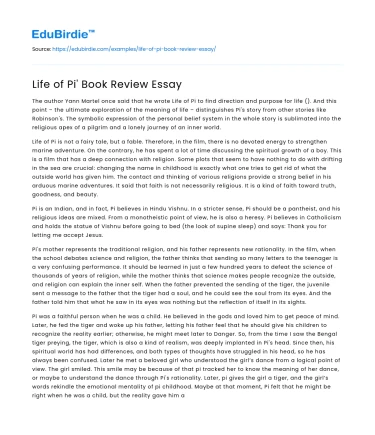The author Yann Martel once said that he wrote Life of Pi to find direction and purpose for life (). And this point – the ultimate exploration of the meaning of life – distinguishes Pi's story from other stories like Robinson's. The symbolic expression of the personal belief system in the whole story is sublimated into the religious apex of a pilgrim and a lonely journey of an inner world.
Life of Pi is not a fairy tale, but a fable. Therefore, in the film, there is no devoted energy to strengthen marine adventure. On the contrary, he has spent a lot of time discussing the spiritual growth of a boy. This is a film that has a deep connection with religion. Some plots that seem to have nothing to do with drifting in the sea are crucial: changing the name in childhood is exactly what one tries to get rid of what the outside world has given him. The contact and thinking of various religions provide a strong belief in his arduous marine adventures. It said that faith is not necessarily religious. It is a kind of faith toward truth, goodness, and beauty.
Save your time!
We can take care of your essay
- Proper editing and formatting
- Free revision, title page, and bibliography
- Flexible prices and money-back guarantee
Pi is an Indian, and in fact, Pi believes in Hindu Vishnu. In a stricter sense, Pi should be a pantheist, and his religious ideas are mixed. From a monotheistic point of view, he is also a heresy. Pi believes in Catholicism and holds the statue of Vishnu before going to bed (the look of supine sleep) and says: Thank you for letting me accept Jesus.
Pi's mother represents the traditional religion, and his father represents new rationality. In the film, when the school debates science and religion, the father thinks that sending so many letters to the teenager is a very confusing performance. It should be learned in just a few hundred years to defeat the science of thousands of years of religion, while the mother thinks that science makes people recognize the outside, and religion can explain the inner self. When the father prevented the sending of the tiger, the juvenile sent a message to the father that the tiger had a soul, and he could see the soul from its eyes. And the father told him that what he saw in its eyes was nothing but the reflection of itself in its sights.
Pi was a faithful person when he was a child. He believed in the gods and loved him to get peace of mind. Later, he fed the tiger and woke up his father, letting his father feel that he should give his children to recognize the reality earlier; otherwise, he might meet later to Danger. So, from the time I saw the Bengal tiger preying, the tiger, which is also a kind of realism, was deeply implanted in Pi's head. Since then, his spiritual world has had differences, and both types of thoughts have struggled in his head, so he has always been confused. Later he met a beloved girl who understood the girl’s dance from a logical point of view. The girl smiled. This smile may be because of that pi tracked her to know the meaning of her dance, or maybe to understand the dance through Pi's rationality. Later, pi gives the girl a tiger, and the girl’s words rekindle the emotional mentality of pi childhood. Maybe at that moment, Pi felt that he might be right when he was a child, but the reality gave him a big blow at this time. He had to leave India and leave the girl in a strange place. His emotional thinking had to accept objective reality.
When the disaster strikes, the juvenile is sent to face a vast ocean alone. The civilized world has gone, and the rest is the naked desire to survive. He instinctively gave birth to fear, fear of sudden disasters and death, fear of losing everything he owned, fear that he would retreat into the most primitive beast. When the tiger finally left without returning, he didn’t even cry. He understands that it is faith that gives him love and hope, but it is this fear and animal nature that inspires his power to survive. This is the epitome of human beings' small and powerful life.
Pi drifted into the sea and came to an island-like paradise. In my opinion, this island is likely to be 'pi' fantasizing after choosing to follow the faith and his understanding of the real world. It is a sign of real society. The Meerkats on the island are like people in our community. Everyone is curious to look at strange things with big eyes, but they don't know the danger of this weird thing. The tiger ate Meerkats, and the other Meerkats were on the side but did not care. It seemed to have nothing to do with himself, which symbolized the indifference of human society. People have worked hard to create wealth, but they are often sneaked and even plundered by others. Just as 'Pi' puts a bed on the tree, it is constantly invaded by the Mole. 'Pi' is very disgusted and wants to drive away from this Meerkat but has no choice but to rush. Unstoppable, seemingly funny but ironic and thought-provoking. The food sources of animals and plants on this island are the bodies of others, and all the beauty is just the appearance.
To sum up, after experiencing a terrible dilemma, Pi still believes in God. Pi is still very happy.






 Stuck on your essay?
Stuck on your essay?

